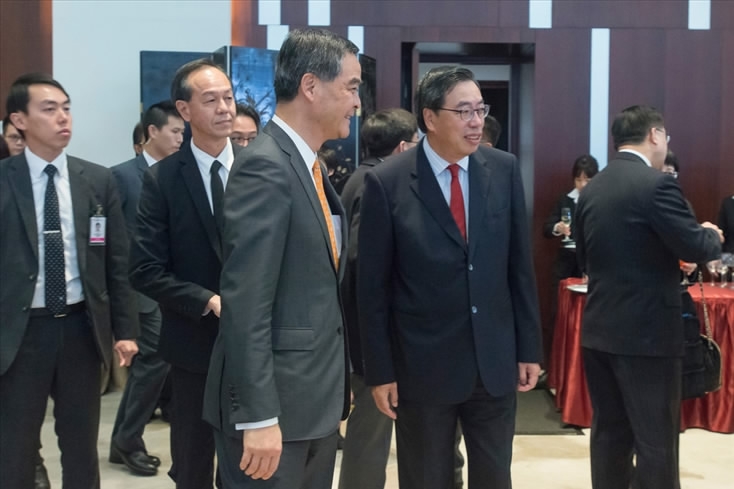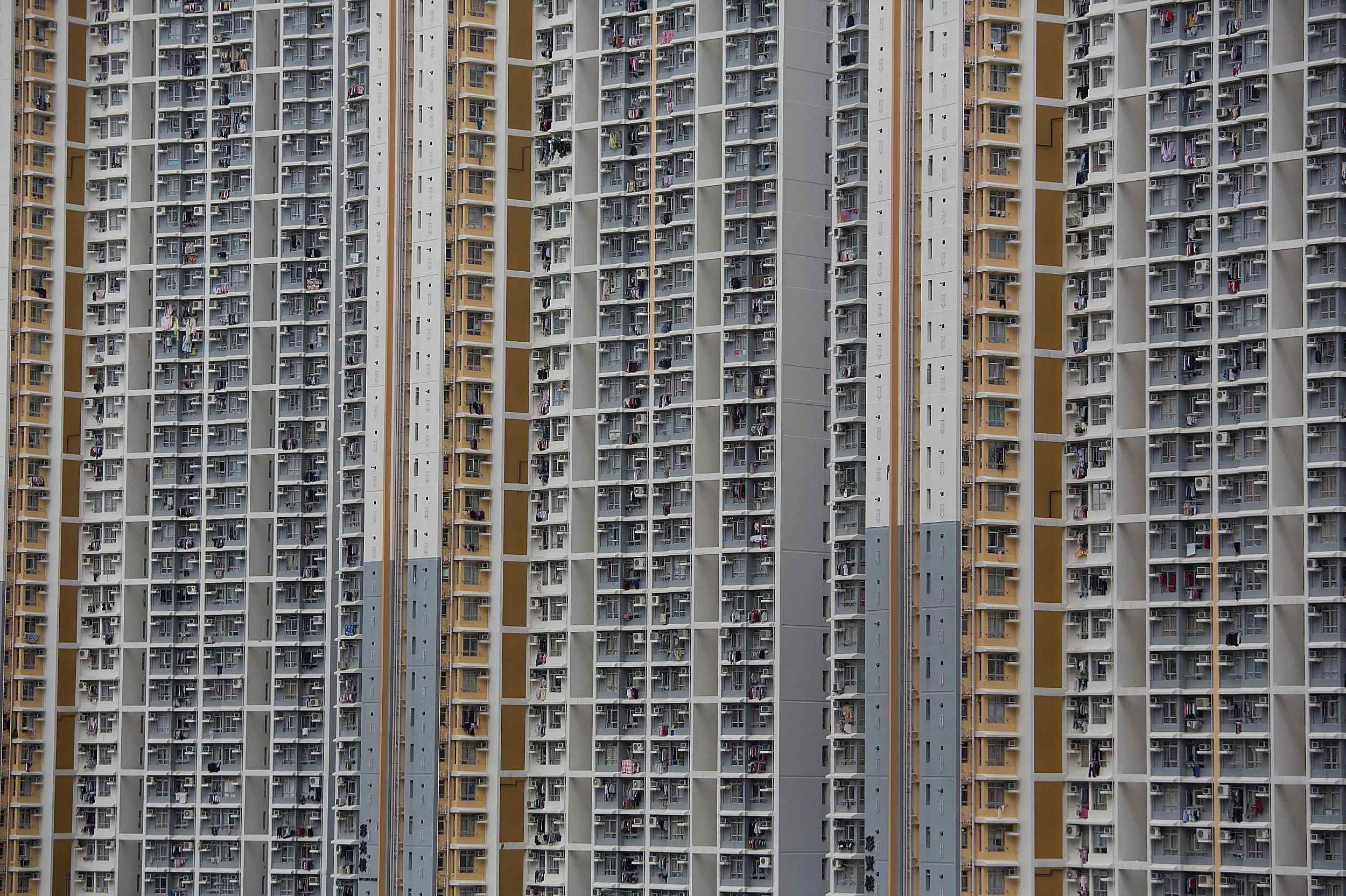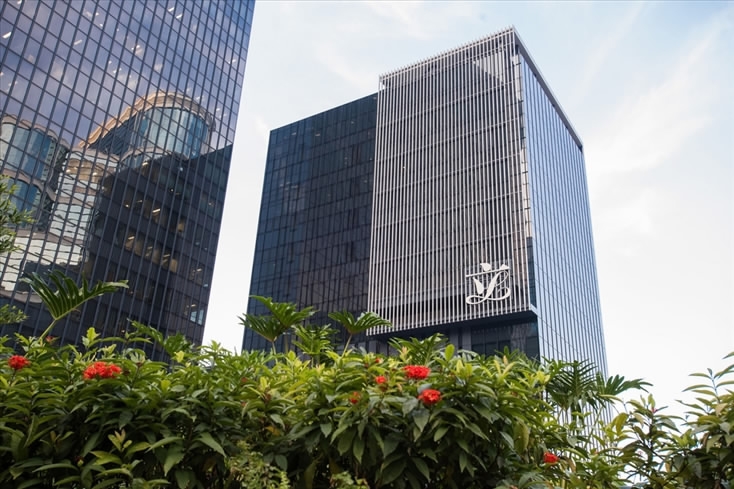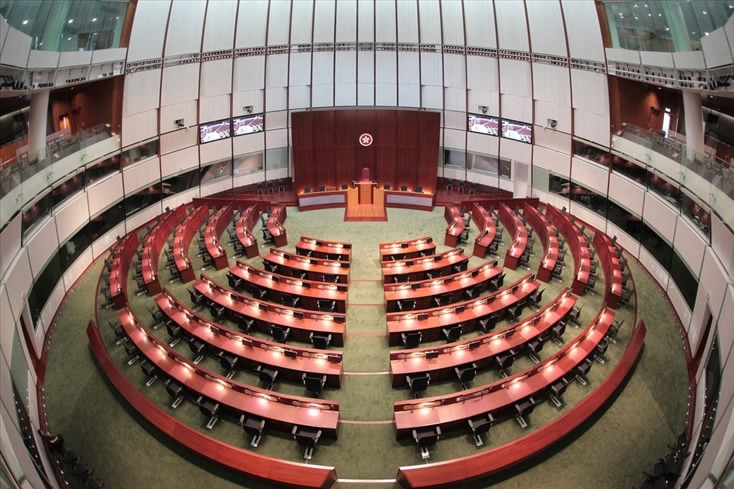By CGTN's Dang Zheng
Andrew Leung, president of Hong Kong’s Legislative Council (LegCo), has vowed to take measures to curtail filibustering, a contentious issue both inside and outside the chamber, and speed up the passage of new legislation.
Speaking to CGTN Digital ahead of the 20th anniversary of establishment of the Hong Kong Special Administrative Region (SAR), Leung said that he intends to act to temper a growing filibuster trend in a bid to improve relations between the legislature and the executive, and to support the next government's social and economic policies.

Leung Chun-ying (L) and Andrew Leung (R). /LegCo Photo
The filibuster has been utilized with increasing regularity in the Financial Committee under the LegCo in recent years, Leung said, referring to a tactic used to delay or postpone the passage of legislation by tabling a large number of amendments, raising spurious points of order and making excessively long speeches in which there is often a great deal of repetition and irrelevance.
The LegCo passed only eight of 29 bills in 2014 with a 28 percent success rate, down from 48 percent in the 2010-2011 session, according to official figures.
The 2015-2016 session was particularly challenging and contentious. Council meetings ended prematurely 11 times as not enough lawmakers were present, an occurrence only twice the previous year. Lawmakers spent around 108 hours on quorum counts, a tactic to filibuster government proposals.

VCG Photo
The LegCo passed a total of 29 bills through the 2015-2016 session, 17 with amendments.
Leung said he will act under the Basic Law and try to put an end to filibustering by cutting short the debate of uncontroversial bills to 60 hours maximum (six days) from 100 hours.
The LegCo Secretariat, the body responsible for supporting the representatives, is also believed to be looking overseas for good practice suggestions, such as allowing a member to move a motion to close a marathon debate.
Leung, noting that Chief Executive-elect Carrie Lam said during her campaign she would focus on livelihood-related bills, added that he will try to prioritize uncontroversial issues on the agenda over the coming months.

Hong Kong LegCo building at Tamar. /LegCo Photo
And he stressed that as the president of the legislature, he will make sure all sides get an opportunity to express opinions.
"I will try to balance the opinions of the two sides, and make sure legislators have the rights to state their opinions," he said.
Oath-taking controversy
Controversy hit the LegCo in 2016, when two representatives violated the Basic Law by improperly taking their oaths of office during a swearing in ceremony.
Leung told CGTN Digital that young legislators must abide by the Basic Law, the mini-constitution of the Hong Kong SAR, and stressed that it was the duty of LegCo members to serve the seven million people living in the city.

Chamber of the Legislative Council Complex. /LegCo Photo
"The average age of legislators in the council lowered remarkably to 52, from 58," the president noted, reflecting on how the make up of the current LegCo has changed. While the younger generation has its own way of expressing itself that can be eye-catching, he added, not everyone has a thorough understanding of "One Country, Two Systems."
Leung admitted the oath-taking controversy was a challenging time, but said:
"(The duo) caused the oath-taking controversy. It was very chaotic in the first weeks… We decided to adjourn the meetings.
"They got to know the repercussions after the Standing Committee of the NPC interpreted the Basic Law.
"They must pledge allegiance to the Hong Kong SAR of People's Republic of China."
'Rule of law' key to Hong Kong
Serving as a pro-establishment lawmaker since 2004, Leung told CGTN Digital that being president of the LegCo is not an easy task.
"The rule of law is the key to Hong Kong's success," Leung stressed. Referencing disorder during the Occupy Central movement in 2014, Leung argued that some of the young people who took to the streets were used.
Certain political parties made the youngsters believe they could override law and order in the name of noble ideas, the LegCo veteran said.
Most people in the city were disinterested in politics and were denied the opportunity to participate in politics under British rule, Leung said, but now the Hong Kong SAR has 70 legislators who are directly elected by the residents.

VCG Photo
"Now we are masters of our own city."
Different opinions on issues are commonplace, said Leung, adding that this is a good way to practice the "One Country, Two Systems" principle.
"At such an important moment, we should slow down, reflect on the achievements we've made during the past 20 years and the challenges that lie ahead - and see what we can improve in the future."
(Edited by John Goodrich)










